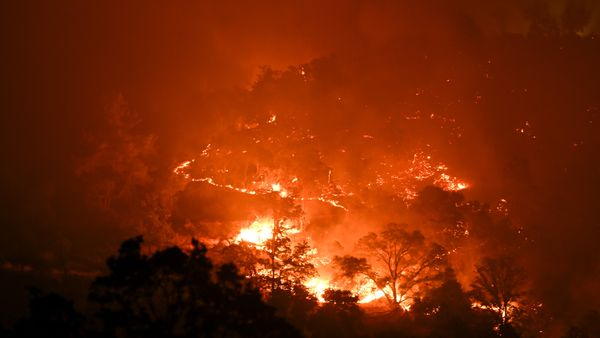'The last 12 months have broken records like never before': Earth exceeds 1.5 C warming every month for entire year
Every month has broken the temperature record of the previous for the past 12 months, and the signs of climate breakdown are already here, a new analysis shows.

Breaking space news, the latest updates on rocket launches, skywatching events and more!
You are now subscribed
Your newsletter sign-up was successful
Want to add more newsletters?

Delivered daily
Daily Newsletter
Breaking space news, the latest updates on rocket launches, skywatching events and more!

Once a month
Watch This Space
Sign up to our monthly entertainment newsletter to keep up with all our coverage of the latest sci-fi and space movies, tv shows, games and books.

Once a week
Night Sky This Week
Discover this week's must-see night sky events, moon phases, and stunning astrophotos. Sign up for our skywatching newsletter and explore the universe with us!

Twice a month
Strange New Words
Space.com's Sci-Fi Reader's Club. Read a sci-fi short story every month and join a virtual community of fellow science fiction fans!
Earth has broken temperature records for 13 consecutive months — with every month registering temperatures 1.5 degrees Celsius (2.7 degrees Fahrenheit) higher than pre-industrial averages, according to a new report.
Every month since June 2023 has been hotter than the one preceding it, making the global average temperature between July 2023 and June 2024 1.64 C (3 F) greater than it was before the Industrial Revolution, when humans started burning fossil fuels to release huge quantities of greenhouse gases into the atmosphere.
"This is more than a statistical oddity and it highlights a large and continuing shift in our climate. Even if this specific streak of extremes ends at some point, we are bound to see new records being broken as the climate continues to warm," Carlo Buontempo, director of the Copernicus Climate Change Service (C3S) which made the report, said in a statement. "This is inevitable, unless we stop adding [greenhouse gases] into the atmosphere and the oceans."
The 12-month streak was in part driven by El Niño (a climate cycle where waters in the tropical eastern Pacific grow warmer than usual) which persisted from June 2023 to May 2024, leading to above-average sea temperatures across the east and central equatorial Pacific.
"The climate continues to alarm us — the last 12 months have broken records like never before — caused primarily by our greenhouse gas emissions and an added boost from the El Niño event in the tropical Pacific," Samantha Burgess, deputy director of C3S, said in the statement.
Related: Extreme wildfires are on the rise globally, powered by the climate crisis
Scientists consider global warming of 2 C (3.6 F) above pre-Industrial Revolution temperatures an important threshold — warming beyond this greatly increases the likelihood of devastating and irreversible climate breakdown.
Breaking space news, the latest updates on rocket launches, skywatching events and more!
But 1.5 C is also an important limit. With rises of 1.5 C, the world's climate edges closer to multiple tipping points that will unleash heat waves, floods, famine and the widespread destruction of ecosystems, the United Nations warned in a 2018 special report.
Under the 2015 Paris Agreement, nearly 200 countries pledged to limit global temperature rises to 1.5 C and safely below 2 C.
While the new findings are troubling, the report stresses that the 1.5 C and 2 C limits are targets for the planet over a 20- to 30-year period — meaning the pledges haven't been officially broken just yet.
But the record-high temperatures are unlikely to fall anytime soon, researchers say. Scientists initially hoped that the end of El Niño might offer the planet a reprieve, but the U.S. is still projected to have warmer-than-average temperatures for the rest of the summer, according to the National Oceanic and Atmospheric Administration.
"I now estimate that there is an approximately 95% chance that 2024 beats 2023 to be the warmest year since global surface temperature records began in the mid-1800s," Zeke Hausfather, a climate scientist at the U.S. non-profit Berkeley Earth, wrote on X.

Ben Turner is a U.K. based staff writer at Live Science. He covers physics and astronomy, among other topics like weird animals and climate change. He graduated from University College London with a degree in particle physics before training as a journalist. When he's not writing, Ben enjoys reading literature, playing the guitar and embarrassing himself with chess.

